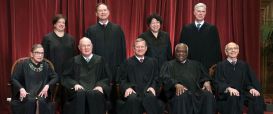
By: Cara L. Gallagher, weekend contributor
It was back to the Supreme Court for me this week. An unusually sleepy end of the October 2016 term, except for gossip of a potential retirement (Kennedy, not Ginsburg, this time), came to a dramatic end when the Chief Justice announced in the final minutes of the Court’s last day that they would hear the travel ban/pause cases next term.
There were two clear victories on Monday with this announcement that the Justices would hear the government’s cases defending President Trump’s two executive orders. One was for an imam named Dr. Ismail Elshikh, whose mother-in-law in Syria will now be able to travel to the United States. The other went to John Doe, an anonymous lawful resident who has been trying to get his wife home from Iran. Their victories came in the form of exceptions to the orders which allow their families to be reunited.
The rest of the Court’s 13-page order largely holds onto the spirit of the executive orders issued by the President, with some caveats.
Using the text of the decision, below is what the Supreme Court said in the grant, followed by the potential effects of those decisions, what all this means, and what happens next.
Background and the previous cases
Continue reading “The real winners in SCOTUS’s decision on the travel ban orders”

 By: Cara L. Gallagher, weekend contributor
By: Cara L. Gallagher, weekend contributor









